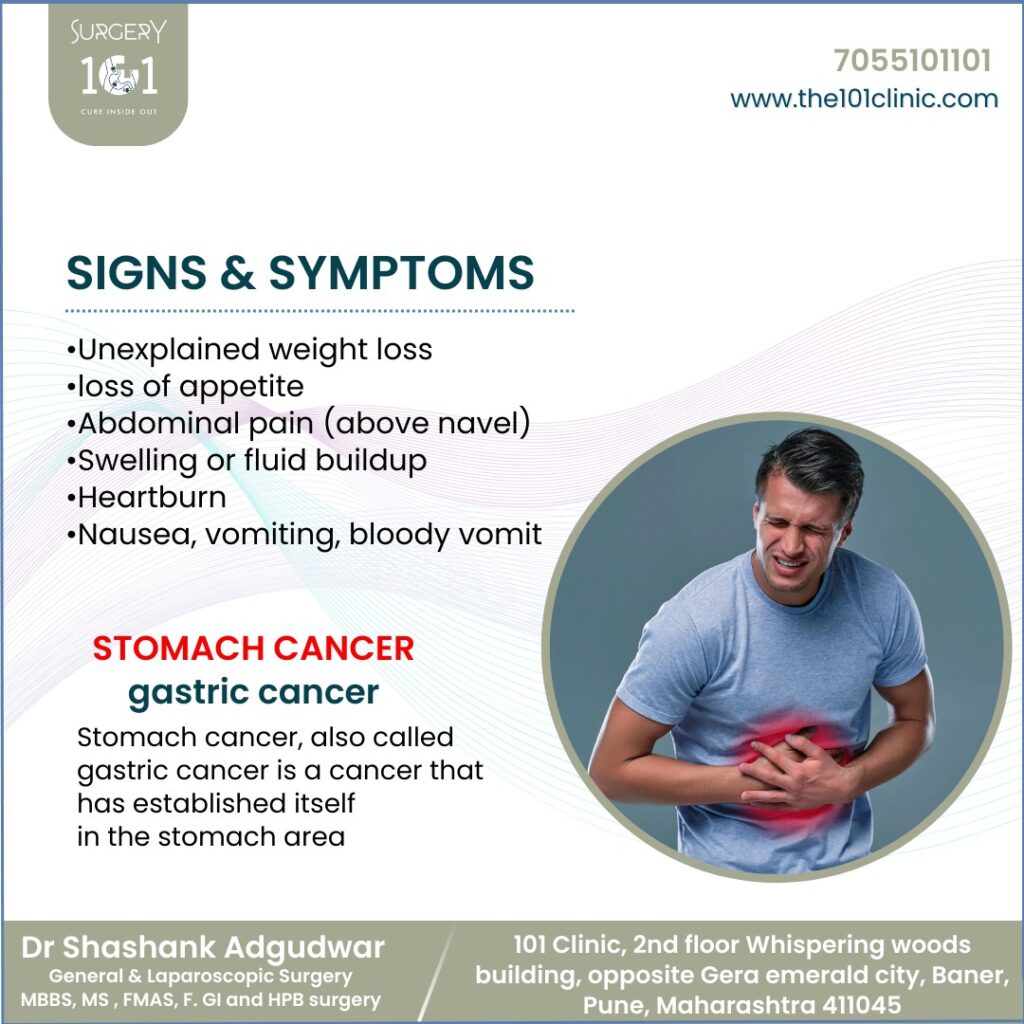Stomach cancer, also known as gastric cancer, begins in the lining of the stomach. Though not as widely discussed as other types of cancer, it is one of the leading causes of cancer-related deaths worldwide. Early detection is crucial for better treatment outcomes, but stomach cancer is often diagnosed in advanced stages due to its subtle symptoms. In this blog, Dr. Shashank Adgudwar, a renowned surgeon, helps shed light on the key aspects of stomach cancer, including its symptoms, causes, and available treatment options.
What Are the Symptoms of Stomach Cancer?
Stomach cancer can be challenging to detect in its early stages as its symptoms often resemble those of less serious conditions. However, being aware of the potential signs can help in early detection and timely medical intervention.
Common Symptoms:
- Persistent Stomach Pain or Discomfort: Pain or discomfort in the abdomen, especially after eating, can be an early sign.
- Unexplained Weight Loss: Sudden weight loss without any significant changes in diet or exercise may be a red flag.
- Loss of Appetite: A reduced desire to eat, or feeling full after consuming only small amounts of food, may indicate stomach issues.
- Nausea and Vomiting: Nausea or vomiting, particularly with blood or a dark substance, can be a sign of advanced stomach cancer.
- Indigestion and Heartburn: Chronic indigestion or heartburn that doesn’t improve with over-the-counter medications might be a symptom of stomach cancer.
- Fatigue: Feeling unusually tired or weak is a common symptom associated with stomach cancer, particularly as the disease progresses.
- Bloody or Black Stools: If stomach cancer causes bleeding, it can result in dark-colored stools, which may indicate internal bleeding.
What Causes Stomach Cancer?
While the exact cause of stomach cancer remains unclear, several risk factors are associated with an increased likelihood of developing the disease:
- Helicobacter Pylori Infection: A common bacterial infection that irritates the stomach lining and can lead to ulcers and cancer over time.
- Family History and Genetics: A family history of stomach cancer may increase your risk, suggesting genetic factors play a role in the disease.
- Dietary Factors: Consuming a diet rich in salty, smoked, or pickled foods, while low in fruits and vegetables, can increase the risk.
- Smoking and Alcohol Use: Smoking and excessive alcohol consumption can damage the stomach lining, leading to a higher risk of stomach cancer.
- Age and Gender: Stomach cancer is more common in individuals over the age of 50 and slightly more common in men than women.
How Is Stomach Cancer Diagnosed?
If you experience symptoms of stomach cancer, it is essential to seek medical attention. Dr. Shashank Adgudwar emphasizes that early diagnosis is crucial for effective treatment. Several diagnostic tools may be used, including:
- Endoscopy: A flexible tube with a camera is inserted into the stomach to examine for abnormal growths or ulcers.
- Biopsy: During endoscopy, a small tissue sample may be taken for lab analysis to determine if cancer is present.
- Imaging Tests: CT scans, MRIs, and ultrasounds can help detect the spread of cancer to other organs.
- Blood Tests: While not definitive, blood tests can help assess overall health and detect any irregularities associated with cancer.
Treatment for Stomach Cancer
Treatment for stomach cancer depends on the stage at which the cancer is diagnosed. Dr. Shashank Adgudwar works closely with a multidisciplinary team to create a personalized treatment plan, which may include:
- Surgery: If the cancer is localized, surgical removal of the tumor or part of the stomach may be recommended.
- Chemotherapy: Chemotherapy drugs are often used to kill cancer cells or shrink tumors, especially in cases where surgery is not possible.
- Radiation Therapy: Radiation can be used in combination with other treatments to target cancer cells.
- Targeted Therapy: Targeted drugs that focus on specific cancer cells may be an option for patients with certain genetic mutations.
- Immunotherapy: A newer approach that helps the body’s immune system recognize and attack cancer cells.
Prevention and Lifestyle Changes
Although stomach cancer cannot always be prevented, making certain lifestyle changes can help lower your risk:
- Quit Smoking: Avoiding tobacco products significantly reduces the risk of stomach cancer.
- Maintain a Healthy Diet: A balanced diet rich in fruits, vegetables, and fiber can help protect against stomach cancer.
- Regular Check-ups: For individuals at high risk (due to family history or Helicobacter pylori infection), regular check-ups and screenings are essential.
Conclusion
Stomach cancer is a serious disease that requires prompt attention. Dr. Shashank Adgudwar and his team emphasize the importance of early detection and personalized treatment to achieve the best outcomes. If you experience any symptoms mentioned in this blog or have concerns about your risk factors, it’s important to consult a healthcare professional for an evaluation.
Remember, early detection is key to better treatment outcomes, so be proactive about your health and make informed decisions.
If you or a loved one require expert consultation or have questions about stomach cancer, Dr. Shashank Adgudwar is available for guidance and treatment options at The 101 Clinic in Baner.

